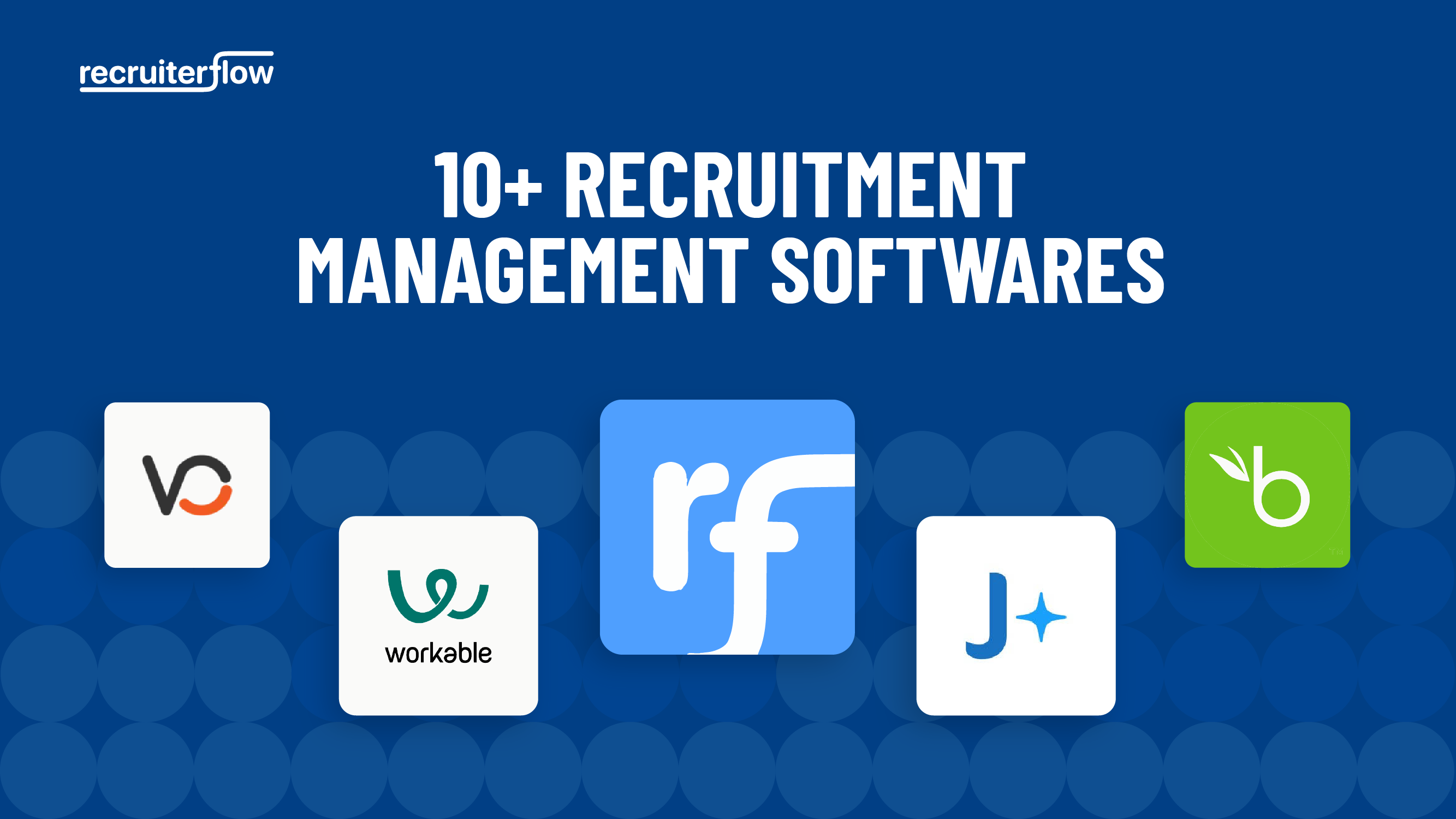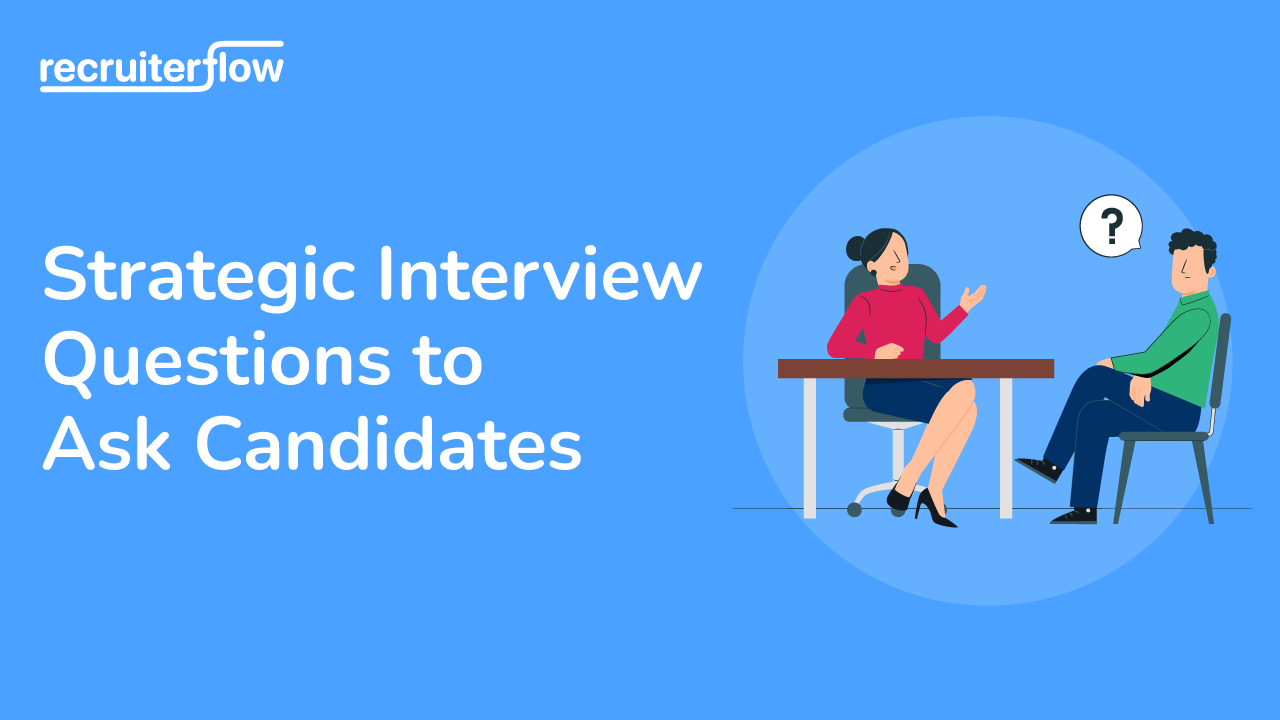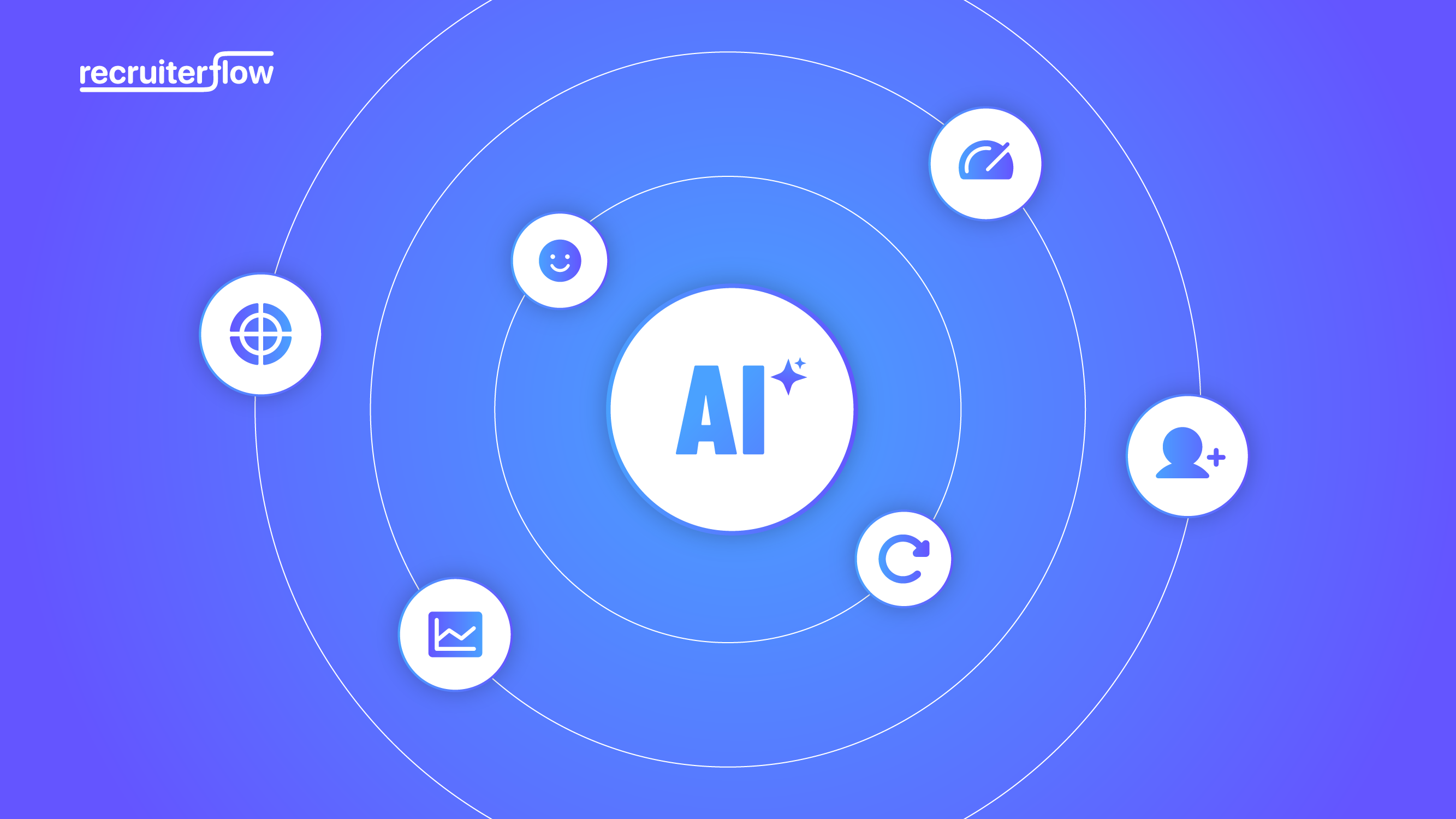
15+ Strategic Interview Questions to Ask Candidates in 2026

A candidate’s suitability for a role depends on their abilities, decision-making, and problem-solving skills. And generic interview questions cannot help with this decision. Here’s where strategic interview questions come into play.
We’ve compiled 16 strategic interview questions to ask candidates to evaluate them better and streamline your screening process. Let’s begin!
What are strategic interview questions?
Strategic interview questions are a set of questions that recruiters ask candidates to assess their ability to think critically, solve problems, and gauge how well the candidate aligns with the company’s values and goals.
What are the types of strategic interview questions?
Most recruiters divide strategic interview questions into three broad categories:
- Behavioral
- Situational
- Career-based
Behavioral Interview Questions to Ask Candidates
Behavioral questions help gain insight into candidates’ decision-making, stress tolerance, and how they handle conflicts.
“75% of recruiters feel behavioral questions help in determining a candidate’s performance.”
1. What has been the most significant challenge you have encountered in your professional career thus far, and how did you address it?
Recruiters can discover a candidate’s ability to assess complex situations, develop strategic solutions, and how they behave in the face of a challenge.
What to consider in an answer
- Problem-Solving Skills: Their ability to identify and break down problems into actionable and effective solutions.
- Composed Under Pressure: Were they able to solve the challenging situation with a cool, calm, and composed mindset?
- Productivity in Adverse Situations: What strategies did they adopt to stay productive?
- Adaptable: If there was a moment, where things didn’t go as planned, how did they respond?
2. Tell me a time when you disagreed with feedback from your manager. How did you handle it?
A strong candidate can stand by their opinion while respecting different viewpoints. Check if they can diplomatically and tactfully handle the difference of opinion (even if they fail to get their way.)
What to consider in an answer
- Receptiveness to feedback: Did they respond to the feedback constructively and positively?
- Communication skills: Were they able to articulate their viewpoints clearly?
- Listening skills: How effectively did they listen to other’s points of view?
- Open-Minded: How open were they to consider and integrate different perspectives?
- Willingness to evolve: Assume the manager isn’t budging, do they find common ground and focus on adapting and evolving or do they stick to their viewpoint only?
3. What are your key strengths? Describe 3 workplace instances in which these strengths were particularly beneficial.
This is one of the most effective strategic interview questions to ask candidates as it provides insight into their self-awareness and how well they leverage their strengths for the benefit of their organization.
What to consider in an answer
- Relevance to the role: Do the strengths demonstrated by the candidate align with the requirements of the role?
- Evidence of results: Can the candidate support their point with measurable results? If not, try to understand their approach to using this strength. If they can’t illustrate that, ask for a non-work-related example.
- Consistency: Have they demonstrated consistency in the application of these strengths or does it appear like an isolated incident?
4. What are your weaknesses? Describe 3 instances in your previous roles where these weaknesses created challenges.
This helps recruiters spot if a candidate can be honest, even in uncomfortable situations. An individual who can express their weaknesses openly is likely to be a great candidate for the organization.
What to consider in an answer
- Honesty and Self-awareness: Are they honest and aware of their limitations?
- Approach to overcome obstacles: How did they address and manage their challenges?
- Efforts to improve: What specific actions did they take to improve their skills and mitigate these weaknesses? (If they fail to include this in their response, make sure to ask it as a follow-up question.)
5. In what way would you handle a moral conundrum at work? If possible, could you give an example?
This question offers insight into a candidate’s values and integrity. While ethical behavior is crucial at all levels, it is especially important in roles that involve a significant level of trust and responsibility.
What to consider in an answer
- Handling the situation: How would they approach the situation and address the ethical issue?
- Importance of principles: What is their outlook towards principles in life (both personal and professional)
Also, check out our blog on reference check questions to enhance your hiring process.
Situational Interview Questions to Ask Candidates
Recruiters usually present hypothetical cases to assess how an applicant responds to certain situations and problems. It is a great recruitment strategy as it allows them to explore applicant’s performance under pressure and gauge their problem-solving skills in real-life scenarios.
6. Can you share a time when you identified a potential issue at your workplace before it became a problem? How did you address it, and what was the outcome?
This question evaluates a candidate’s proactiveness and capacity to identify and implement changes. It showcases their confidence in addressing a problem and creativity in solving it. Additionally, it demonstrates the candidate’s understanding of organizational dynamics and their commitment to their team’s growth.
What to consider in an answer
- Clarity: How clear is their thought process and how effectively do they communicate the issue?
- Collaboration with team members: How did they work with others to develop and implement the solution?
- The Outcome: What was the outcome and how did they react to it?
7. How do you manage multiple tasks and what would you do if you’re running behind schedule on some of them?
Studies indicate that nearly 80% of professionals encounter high-pressure scenarios in their careers. As a recruiter, it’s crucial to know the candidate’s abilities in time management, decision-making, organizational skills, and team collaboration.
What to consider in an answer
- Project Management: How did they handle a project if it had multiple stakeholders? How did they delegate the responsibilities?
- Addressing Unexpected Challenges: Did they face any unexpected challenges? If yes, how did they find their way around it?
- Project Delays: How did they manage and communicate about any delay in the project deliverables?
8. Can you share an example where you took ownership of a project? How did you plan, implement, and communicate your strategy to the team?
This question is designed to assess a candidate’s leadership skills, proactiveness, and ability to manage a project. It also provides insight into how they plan, implement, and communicate strategies to reach a desired outcome.
What to consider in an answer
- Ownership and Initiative: How did they take responsibility for the project?
- Planning and Strategy Development: How did they plan the project? How did they set the goals and timelines?
- Implementation: What steps did they take to execute the project, and how did they make sure they stayed on track?
- Communication: How did they effectively communicate their strategy and track the progress of the project?
9. Share an experience where you collaborated with someone you found challenging to work with. How did you handle the situation?
This helps explore a candidate’s conflict resolution ability, interpersonal skills, and professionalism. Additionally, it reveals how they maintain productivity in potentially challenging situations
What to consider in an answer
- Professionalism: How did they maintain a professional demeanor towards the colleague?
- Communication: How did they effectively communicate their thoughts and did they try to understand the other person’s perspective?
- Goal-Oriented: How did they ensure the project goals were met despite interpersonal difficulties?
- Stressful situation: Was there a moment where things got out of hand and led to a conflict? If yes, how did they manage it? (You can ask this as a follow-up question.)
10. How would you approach learning a new skill for a critical project?
This question is ideal for assessing if a candidate is a quick learner, an essential quality in dynamic work environments or a fast-paced organization. It reflects their ability to adapt and stay agile in pressured situations.
What to consider in an answer
- Openness to learning: How enthusiastic were they about acquiring the new skill? Do they like approaching unfamiliar tasks? (Ask this as a follow-up question)
- Agility: Were they able to quickly adapt and remain productive?
- Comfort with uncertainty: How comfortable were they stepping out of their comfort zone?
- Reflection: What did they learn from the experience, and how would they apply those lessons to future projects (This is a good follow-up interview question to ask candidates for a deeper understanding of the candidate)
Career-Based Interview Questions to Ask Candidates
This set of strategic interview questions to ask candidates is designed to gain a deeper understanding of the candidate’s work and career aspirations. It helps discern why a candidate has shown interest in the role and how it aligns with their long-term career goals. By assessing their motivation and aspirations, recruiters can filter candidates who are likely to be a long-term asset for the clients.
11. Can you share three reasons why this role aligns perfectly with your skills and career aspirations?
This type of question tells if the applicant understands the role requirement and if it aligns with their current skills. An ideal candidate would have a strong understanding of the business, website, and social media accounts of the company.
What to consider in an answer
- Interest level: What level of excitement are they demonstrating for the position and the company?
- Skills and goals: How well do the skills and goals of the candidate match with the client’s needs and requirements?
- Research effort: How thoroughly have they researched about the company and the role? How well have they understood the culture, values, and objectives?
12. What are your short, medium, and long-term career goals?
This question is important because it talks about a candidate’s immediate (6 months to a year), slightly long-term (1 year to 3 years), and long-term (5 years+) plans. It helps gauge whether they can be a long-term asset for the client.
What to consider in an answer
- Alignment of role and vision: To what extent do their plans correspond with the current offerings of the role? And does it fit into the long-term vision of the organization?
- Expectations: Will this position support the candidate’s career aspirations and expectations?
- Practicality: How well-thought-out and practical are their goals?
13. How do you keep yourself informed on the latest trends and technology?
A big plus for any candidate is their drive to learn and adapt in an ever-changing work environment. It highlights how serious their career growth is to them and their ability to integrate new trends and technologies into their work.
What to consider in an answer
- Learning Opportunities: How do they leverage the resources available to them for their growth and learning?
- Efficiency: How efficient is their learning process? Do they waste time on things that could be streamlined, or are they leveraging tools like AI to streamline their learning?
- Application: Can they provide instances where they have applied the acquired skills or knowledge in a professional setting?
14. What are your compensation expectations?
This question might sound basic but is a good interview question to ask candidates as it maintains transparency. It helps the recruiters figure out if the expectations are within the range.
What to consider in an answer
- Expectations: Do their salary expectations align with the industry norms?
- Experience: Does their expected salary match their degree of expertise and experience?
- Role understanding: Have they understood the role and its requirements to justify their salary expectations?
15. What tools or software have you used in your previous roles and what are your efficiency levels in those?
This is an important question because it tells a recruiter whether a candidate has merely listed the skill on the resume or can effectively leverage the technology to deliver better results.
What to consider in an answer
- Application process: Can they share instances where they have used the technology successfully in a work-related situation?
- Skill Level: How skilled are they in applying the acquired knowledge?
- Impact: How has it benefited their ongoing projects or day-to-day work?
16. What are your top three professional achievements you’re most proud of?
This question highlights a candidate’s peak performance levels. This can uncover many things like– what working conditions suit them the most, their work ethic, and values, and how their accomplishments impacted their previous organizations.
What to consider in an answer
- Relevance: Are the accomplishments in line with the current position’s requirements?
- Impact: How did their achievements benefit the organization?
- Drive: How did they stay motivated in moments when things weren’t going in their favor? (Ask this as a follow-up question.)
Things to consider while asking interview questions to a candidate
Even though every role comes with specific requirements, you can customize and improvise this list of questions to create your list of strategic interview questions to ask candidates.
Here are two factors to consider while asking interview questions
Steer clear of common pitfalls
- Inappropriate questions: Asking questions that can be interpreted as prejudiced, pointless, or unduly intimate is not a good idea.
- Closed-ended questions: Avoid asking questions that leave no room to gauge the candidate’s abilities.
- Premature judgment: Avoid drawing conclusions too quickly or ending conversations too soon. Give candidates enough time to respond.
- Avoid trickery: Don’t create stressful situations or ask trick questions that could unsettle candidates.
- Attention: Make sure you don’t appear disinterested or get distracted in your thoughts. Having a systematic way to document interview notes during the conversation allows you to focus on the candidate’s responses while maintaining accurate records for later evaluation.
Kick off strong interviews with great JD context — use our AI Job Description Generator to write clear, role-focused descriptions that guide your question strategy.
Place Special Emphasis on Follow-Up Questions
Although the initial inquiries are important, follow-up questions might yield more in-depth information and also leave an impression on the candidate that you care about their journey. Think about enquiring along the lines of:
“What makes you believe that?”
“What made you decide that way?”
“How did you go about this?”
“What was the outcome?”
“Would you please elaborate?”
“What difficulties did you face?”.
Ready to put the list of interview questions into action?
Recruitment



Abhishek Sharma